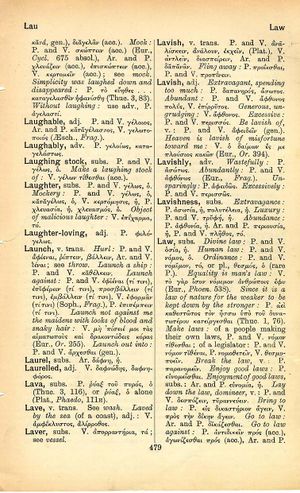laver: Difference between revisions
From LSJ
τὸ ἓν καὶ τὸ ὂν πολλαχῶς λέγεται → the term being and the term one are used in many ways, one and being have various meanings, one and being have many senses
(Gf-D_5) |
(3_7) |
||
| Line 9: | Line 9: | ||
{{Gaffiot | {{Gaffiot | ||
|gf=<b>lăvĕr</b>, ĕris, n., [[sium]] ou berle [plante] : Plin. 26, 50 ; 22, 84. | |gf=<b>lăvĕr</b>, ĕris, n., [[sium]] ou berle [plante] : Plin. 26, 50 ; 22, 84. | ||
}} | |||
{{Georges | |||
|georg=laver, eris, f. ([[lavo]]), eine Sumpfpflanze, [[sonst]] [[sium]] [[gen]]., Plin. 26, 50. | |||
}} | }} | ||
Revision as of 09:27, 15 August 2017
English > Greek (Woodhouse)
subs.
V. ἀπορραντήρια, τά; see vessel.
Latin > English (Lewis & Short)
lăver: ĕris, f.,
I a water-plant, Plin. 26, 8, 32, § 50; called also sion, id. 22, 22, 41, § 84.
Latin > French (Gaffiot 2016)
lăvĕr, ĕris, n., sium ou berle [plante] : Plin. 26, 50 ; 22, 84.
Latin > German (Georges)
laver, eris, f. (lavo), eine Sumpfpflanze, sonst sium gen., Plin. 26, 50.

